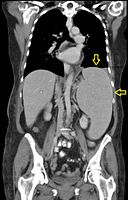
Photo from wikipedia
INTRODUCTION Following bariatric and metabolic surgery (BMS), patients may develop persistent cytopenia(s) despite adequate micronutrient levels. A comprehensive analysis of laboratory and hematopathologic findings in BMS patients with unexplained cytopenia(s)… Click to show full abstract
INTRODUCTION Following bariatric and metabolic surgery (BMS), patients may develop persistent cytopenia(s) despite adequate micronutrient levels. A comprehensive analysis of laboratory and hematopathologic findings in BMS patients with unexplained cytopenia(s) has not been previously described. METHODS We reviewed the clinical and laboratory data, bone marrow histology, and used ancillary testing to characterize patients with a history of BMS who had subsequent bone marrow biopsies due to unexplained cytopenia(s). RESULTS All patients had anemia and 59% (23/39) had additional cytopenias. Myelodysplastic syndrome (MDS) and clonal cytopenia of unknown significance (CCUS) were diagnosed in 8% (3/39) and 10% (4/39), respectively. Remaining cases were classified as idiopathic cytopenia of unknown significance (ICUS) with anemia alone (ICUS-A) in 47% (15/32) or multiple cytopenias (ICUS-PAN) in 53% (17/32). Time since surgery, age, or amount of weight loss was not associated with a specific diagnosis. No patient was vitamin B12 or folate deficient. However, vitamin B6 and zinc were decreased in 47% (5/11) and 29% (9/29), respectively. Examination of bone marrow aspirates revealed slight erythroid dyspoiesis affecting <10% of precursors in 60% (9/15) ICUS-A and 59% (10/17) ICUS-PAN. CONCLUSION Bone marrow findings in patients with unexplained cytopenia(s) after BMS are not specific in the majority of cases, and caution is advised when interpreting dyserythropoiesis. Levels of micronutrients and vitamins other than iron, folate and vitamin B12 are frequently disturbed in this patient cohort and warrant correction and close clinical follow-up.
Journal Title: International journal of laboratory hematology
Year Published: 2021
Link to full text (if available)
Share on Social Media: Sign Up to like & get
recommendations!